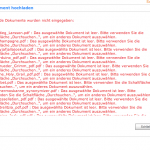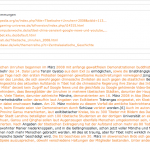Software Profile | Description | Pros & Cons | Report | Usability | Summary | Screenshots | Links
Software Profile
| ID | S13-05 |
| Product | Ephorus |
| Company | Ephorus Nobelstraat 4 3512 EN Utrecht The Netherlands email: support@ephorus.com |
| Web-Site | http://www.ephorus.com/ |
| Software-Type | Online, with an API for integration in learning management systems |
| Pricing | 0.60-5.00€ per student and year |
| Testdate | 21 March 2013/28 March 2013 |
Description
Ephorus is a Dutch company which specifically states that it only offers its plagiarism detection services to teachers, not to students. Ephorus costs between 0.60-5.00€ per student and year. A free demonstration version is available, but you must prove to Ephorus that you are an employee of an educational institution and not a student in order to obtain access to this evaluation version.
Pros & Cons
Ephorus offers an API which can be integrated into learning management systems such as Moodle. Teachers can upload files themselves, or they can generate an email address for the students to send in the texts for examination themselves.
Apart from the problems that Ephorus had on effectiveness – it did not receive even 60% of the points – there were a number of problems encountered. If the user does not change the default setting, one confirmation email per uploaded document will be received. It can only be recommened that users who upload a high number of documents disable this function. Secondly, the system takes quite a long time to analyze uploaded documents – up to six hours was needed, even for small texts. Many other systems return the results after a few seconds or minutes of processing, so Ephorus can be considered to be very slow. Thirdly, Ephorus still cannot handle German umlauts and does not offer the upload of ZIP files. Additionally, it does not find sources from Google Books and can not process PDF files without OCR. Strangely enough, it was able to work with the Hebrew characters and even found a Hebrew potential source – a copy of the Wikipedia – but not the Wikipedia page itself.
Report
Ephorus offers a side by side view which is very difficult to find, as it is labelled as „detailed“ view. It is also a bit confusing at time. But it does highlight words that were changed from the original and in doing so gives valuable information to the educator examining the report. In a few cases the percentages displayed by Ephorus exceeded the real plagiarism percentages that were calculated before the test. This demonstrates again how unreliable these percentages are.
Ephorus often does not find the original Wikipedia as source, but displays Wikipedia duplicates. It also often displays links to web sites that no longer exist and thus can be of little help to the user.
For some unknown reason Ephorus did not find sources from the German newspaper Süddeutsche Zeitung, although the articles can easily be found using Google and most other plagiarism detection systems were able to find these sources. Ephorus does not find the sources for plagiarism in larger documents that it found in smaller ones.
Usability
Ephorus offers an average usability. Some options are useful, some can be improved, but especially the side-by-side view can only be used if users actually find it.
Summary
All in all, Ephorus did find a number of sources for the plagiarism. However, it did not find most original articles from the Wikipedia and the Süddeutsche Zeitung and itneeded long time to analyze the uploaded documents. The German umlaut problem is a definite detractor for use in the German educational system. With the problems encountered in the report view the system is deemed complicated to use and only marginally useful for educational purposes.
Screenshots
- E-Mail notifications by Ephorus
- Upload erros in Ephorus
- Not processed umlauts in Ephorus
- Report View in Ephorus




